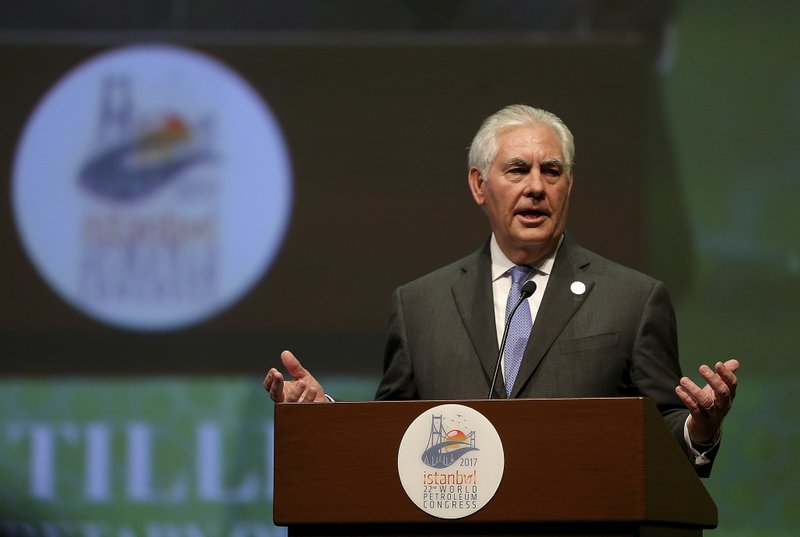KUWAIT CITY -- President Donald Trump's administration tossed aside its aversion to mediating a weeks-long Persian Gulf dispute Monday, as the top U.S. diplomat flew to the region hoping to corral Qatar and its neighbors into negotiation.
On his first foray into shuttle diplomacy since becoming secretary of state, Rex Tillerson will hop between Kuwait, Qatar and Saudi Arabia from Monday until Thursday, testing ways to break an impasse that has persisted despite Kuwaiti mediation efforts. The crisis has badly damaged ties between several key American partners, including hosts of two major U.S. military bases, threatening counterterrorism efforts.
Tillerson landed in Kuwait City late Monday and was greeted at the airport by the Gulf country's foreign minister, who chatted with Tillerson in the searing Kuwaiti sun and shared a traditional Arabic coffee. On his first day in the country, Tillerson also met with Kuwait's ruler, Sheikh Sabah Al Ahmed Al Sabah.
"We are trying to resolve an issue that concerns not just us but the whole world," Sabah told the visiting U.S. diplomat.
U.S. officials said Tillerson doesn't expect an immediate breakthrough, which they warned could be months away. Rather, they said, he wants to explore possibilities for sparking negotiations.
"We've had one round of exchanges and dialogue and didn't advance the ball," senior Tillerson adviser R.C. Hammond said.
For the U.S., there are risks in getting so intimately involved in the fight among Gulf neighbors, reflected in Tillerson's initial reluctance to play a central mediating role. Alienating either side of the conflict could pose broader challenges for U.S. priorities in the region, including the fight against the Islamic State group and other extremists.
Lori Plotkin Boghardt, a Gulf expert at the Washington Institute for Near East Policy, said the U.S. has had some success in recent years persuading Qatar to take action against terrorist financiers. She said if the U.S. appears to be siding with the Saudis and the others, the Qataris could respond by reverting to old habits.
Qatar has rejected 13 demands of Saudi Arabia, Bahrain, the United Arab Emirates and Egypt to restore diplomatic relations and end a blockade they've imposed on the small, gas-rich monarchy since early June. They include Qatar shutting down the media network Al-Jazeera, cutting ties with Islamist groups including the Muslim Brotherhood, limiting ties with Iran and expelling Turkish troops stationed in the country.
Hammond said the package of demands, as issued by Qatar's neighbors, was not viable, but said there were individual items on the list "that could work." Hammond would not elaborate on which demands Qatar could meet, but said concessions from the others would be required.
"This is a two-way street," he said of a dispute among parties who each have been accused of funding extremists in some way. "There are no clean hands."
U.S. military interests are at stake, too. Bahrain hosts the U.S. Navy's 5th Fleet, which patrols Gulf waters with a close eye on Iran. Qatar hosts al-Udeid Air Base, the largest U.S. military installation in the Middle East and hub for the U.S.-led anti-Islamic State coalition operations in Iraq and Syria.
The specifics of Tillerson's shuttle travel, including exact dates for each stop, were still in flux on Monday and not immediately announced.
Earlier Monday, Tillerson spoke to Turkey-based American diplomats in Istanbul and acknowledged severe strains in U.S.-Turkey relations. He said he is hopeful, however, of mending ties with the NATO ally and partner in the anti-Islamic State coalition. He also said he hoped that the U.S. and Turkey could replicate an agreement reached last week between the U.S., Russia and Jordan for a ceasefire in southwestern Syria in the north of the country.
Tillerson said he believed the two countries are beginning to restore mutual trust that had been lost over the course of the past several years. He said since becoming secretary of state, he had met three times with Turkish President Recep Tayyip Erdogan -- including a lengthy session on Sunday night -- and that each time the tone of the conversation had improved. While challenges remain, Tillerson said he believed the first steps to re-establishing relations "on the proper basis" have been taken.
Tensions between Washington and Ankara have been high over U.S. support for Kurdish rebels in Syria, Turkey's crackdown on dissent, particularly since last year's failed coup, and Turkish allegations the U.S. was sympathetic to the coup-plotters -- accusations that American officials have vehemently denied.
Information for this article was contributed by Josh Lederman of The Associated Press.
A Section on 07/11/2017

